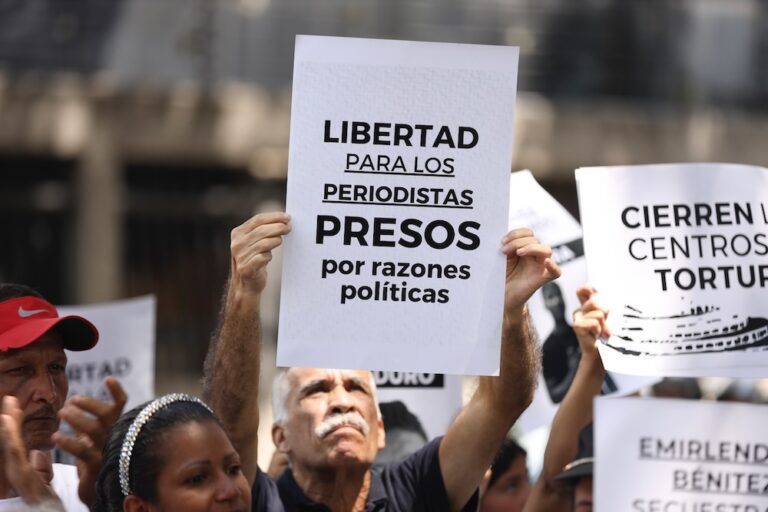(AMARC/IFEX) – The following is a 20 April 2001 statement by AMARC, followed by the Forum on Communications Declaration submitted to the Second Peoples’ Summit of the Americas: Dear friends: At the Peoples’ Summit of the Americas, more than 2,000 delegates representing members of the broad-based social coalition called the Hemispheric Social Alliance met to […]
(AMARC/IFEX) – The following is a 20 April 2001 statement by AMARC, followed by the Forum on Communications Declaration submitted to the Second Peoples’ Summit of the Americas:
Dear friends:
At the Peoples’ Summit of the Americas, more than 2,000 delegates representing members of the broad-based social coalition called the Hemispheric Social Alliance met to discuss the Free Trade Areas of the Americas, an economic integration agreement being negotiated at the exclusion of civil society. We met to share perspectives and strategies affirming that Another America is Possible. Nine forums were organized to discuss critical issues concerning education, labour, agriculture, the environment, women, human rights, communications, the role of the parliament, and the role of the state in the redistribution of wealth. After two intensive days of work, the Forum on Communications (April 17-18, 2001) organized by AMARC-International concluded with a declaration that was submitted to the Peoples’ Summit of the Americas (Quebec, Canada) at large. More than seventy-people attended the Forum on Communications, with participants from eleven countries of Latin America and the Caribbean: Uruguay, Paraguay, Brazil, Bolivia, Ecuador, Argentina, Chile, Mexico, Peru, Columbia, and Haiti. Participants from Canada and the U.S. represented North America, and international participants came from Nigeria, Senegal, Belgium, and France.
We submit to you here, the final declaration of the Forum of Communications. It will soon be available in Spanish, French, and Portuguese, the four official languages of the Peoples’ Summit.
Initially excluded from the Final Declaration of the Peoples’ Summit, AMARC had another opportunity to express its commitment to defend the Right to Communicate at the closing plenary session. More than 1,000 delegates heard the affirmation that communications is a critical sector in the struggle to democratize society, and that the Right to Communicate must be recognized as a universal human right, which must be preserved and extended in the context of the new challenges of globalization.
This marks an important step in the process to inform civil society about what’s at stake in the communications sector if the Right to Communicate is not recognized as a global concern. The Final Declaration of the Peoples’ Summit was submitted to the official Summit of the Americas, which begins today in a gathering of the 34 heads of state of all countries of the Americas, except Cuba. The official summit organizers refused a bi-lateral meeting with a representative delegation of the Peoples’ Summit. The struggle continues.
Elvira Truglia, AMARC-International
FORUM ON COMMUNICATIONS DECLARATION
Peoples’ Summit of the Americas
April 17-18, Quebec, Canada 2001
1. At the first Peoples’ Summit, communication was not even conceived of as a sector in its own
right. Therefore, it was not recognized as a critical strategic sector in the struggle to
democratize society. Since 1998 four major trends have matured: 1. The concentration and
monopolization of the communications sector; 2. The control over information, knowledge
and the homogenization of opinion; 3. The blossoming of the technological revolution; 4. The commodification of information, knowledge and culture. A kind of “universal, neutral”
information has been imposed negating pluralism, and cultural, linguistic and gender
diversity. Despite these trends, there has been phenomenal growth of the community and
independent media sector, evidenced by the Forum on Communications which was held at the 2nd Peoples’ Summit of the Americas, April 17-18, 2001.
2. We urge the Peoples’ Summit at large to join with the Forum on Communications in
recognizing that communications is a critical sector of social struggle and that it is a human
right that underpins all other human rights. Consider the media campaign that has been
launched to oppose the FTAA. Further, we urge the Peoples’ Summit to consider this reality
in future planning and to give the topic the importance it deserves on both the theoretical and practical levels. Finally, we call for your support of the following recommendations:
A. The right to communicate be recognized as a human right by civil society as well as
government and international bodies.
B. The sovereignty of states to regulate on issues regarding the communications sector
(process and content) be guaranteed within any international economic agreements.
C. The Right to communicate be recognized constitutionally, and be properly legislated and
enforced through appropriate regulation and policies (eg. through anti-trust laws).
D. Considering communications as part of the global commons, corporations should pay for
the use of this public space. Funds should be used to ensure sustainable community and
independent media and should be distributed and managed according to the principles of
economic solidarity and under the control of civil society.
E. The market economy is not the only model for shaping the communications infrastructure. People must be seen as producers and contributors of information and not be defined solely as consumers.
F. That universal access be the standard for all new technologies and that access be maintained for mature technologies. This includes giving people the necessary training in order to create their own content free from the constraints of the market.
G. Call for an ongoing public discussion and debate regarding the new problems concomitant to new technologies including rights of privacy, intellectual property, and a transparent decision making process within corporations and governments.
H. Civil society and non-governmental organizations should re-appropriate the terms of
discussion in formulating communications policy and regulation.
3. Based on these recommendations, this is a work in progress. This document is a preliminary
version of the chapter on communications to be included in the Alternatives of the Americas
document. A fuller version will be developed over the next few months prior to the compilation of the next edition of the Alternatives of the Americas document based on the ongoing input from the participants of the Forum on Communications and the existing networks and organizations which have been parties to this process. The Forum on
Communications submits this process for approval and support to the plenary session of the 2nd Peoples’ Summit of the Americas.
4. The Forum on Communications at the 2nd Peoples’ Summit of the Americas was attended by
representatives from Canada to Tierra Del Fuego who gathered to strategize about means of
ensuring the democratization of media and thereby our societies. We recognize that the Right to
Communicate is a universal human right which serves and underpins all other human rights and
which must be preserved and extended in the context of the new challenges of globalization. It should be recognized that community media has directly and substantially contributed to the
democratization of political systems including the overthrow of repressive regimes. Although we
came together primarily from the Western Hemisphere, we believe these principles to be
universal and commit to the realization of them globally.


